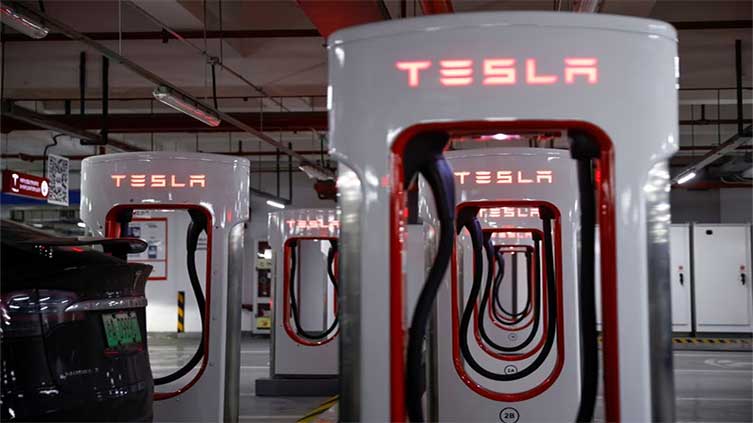White House welcomes Tesla to take advantage of federal dollars for chargers

Business
Biden administration first time directly connected Tesla regarding new speed chargers on highways
(Reuters) - The White House said electric-vehicle charging stations using Tesla standard plugs would be eligible for billions of dollars in federal subsidies as long as they included the U.S. charging standard connection, CCS, as well.
The statement follows separate announcements by U.S. automakers Ford Motor and General Motors that they were adopting the Tesla model of charging, known as the North American Charging Standard (NACS). The moves shake up a charging industry that looked like it was drifting toward the rival CCS connection, with the help of federal subsidies.
This is the first time the Biden administration has directly connected Tesla to its efforts to spend up to $7.5 billion to build new, high-speed chargers on some 7,500 miles of the nation's busiest highways.
Tesla shares rose 4.1%. Analysts said the Ford and GM news was a big win that could make Tesla Superchargers an industry standard in the United States.
GM and Ford shares closed up 1.1% and 1.3%, respectively.
But shares in EV charging firms such as ChargePoint, EVgo and Blink Charging fell 11%-13% as the alliance between the three automakers raised questions about their fate. They were flat after hours.
Some of them said on Friday that they would work to adapt to the Tesla standard.
"Earlier this year, we developed minimum standards to ensure publicly funded EV charging is accessible, reliable, and affordable for all drivers, and we required interoperability to promote competition," White House spokesperson Robyn Patterson said in statement to Reuters. "Those standards give flexibility for adding both CCS and NACS, as long as drivers can count on a minimum of CCS."
Patterson said the goal is for every car to be able to use every publicly funded charger. "More drivers having access to more high-quality charging – including Tesla Superchargers – is a step forward."
The statement did not say whether it was enough for Tesla to provide a CCS adapter to connect to charging ports at non-Tesla chargers.
Earlier this year, the administration welcomed Tesla's decision to open up its charging network to competitors but stopped short of discussing how the company would be involved in its charging efforts.
Most large global automakers use the CCS network in the United States, including Volkswagen, Hyundai Motor and Kia.
A fight between competing standards will raise costs for consumers and vendors, said Oleg Logvinov, chief executive of EV charging parts supplier IoTecha.
Logvinov, who is also the president of CharIN North America, an industry body that promotes CCS, said the organization was backing CCS because it had worked more than a decade with multiple vendors and Tesla's technology was not as tested.
INDUSTRY SHAKEUP
"What's the cost of having all those CCS ports that are being used by the minority in the market? What's the opportunity cost of that?" said Sam Houston, senior vehicles analyst at non-profit science advocacy group Union of Concerned Scientists.
Tesla's network is the largest for fast charging in the United States.
The partnership among three of the biggest U.S. automakers ensures that more than 60% of the country's EV market can NACS.
"Whether other charge point systems disappear in the same way that Betamax video tapes disappeared in the 1980s is likely to depend on policymakers," said Danni Hewson, head of financial analysis at AJ Bell. "But at the moment Tesla is way ahead of the pack and the gap is widening."
A spokesperson for Blink said the company welcomed "the opportunity to work with Tesla on interoperability with cables and connections."
EVgo Chief Commercial Officer Jonathan Levy said the company would continue to "serve all EV drivers no matter what fast charging connector they use" and was working with NACS suppliers to meet drivers' needs.
ABB e-mobility North America, a big maker of EV chargers that supplies operators, fleets and retailers, said it will be offering a NACS connector option to its products that it is now designing and testing.
"We've been working with Tesla and collaborating on this. They've been very helpful," said Asaf Nagler, a senior executive at the company, a unit of the Swiss industrial firm ABB.
ChargePoint was not immediately available for comment.
Smaller EV companies including Rivian and Lucid did not immediately respond to requests for comment. Their shares closed down just over 1%.
Tesla has been testing the use of CCS connectors to allow non-Tesla vehicles to use its Superchargers.
Last week, the Biden administration updated its guidelines to say people will receive federal subsidies to buy proprietary adapters if they are compatible with a permanently attached CCS connector, potentially making Tesla's adapters eligible for the grant.

